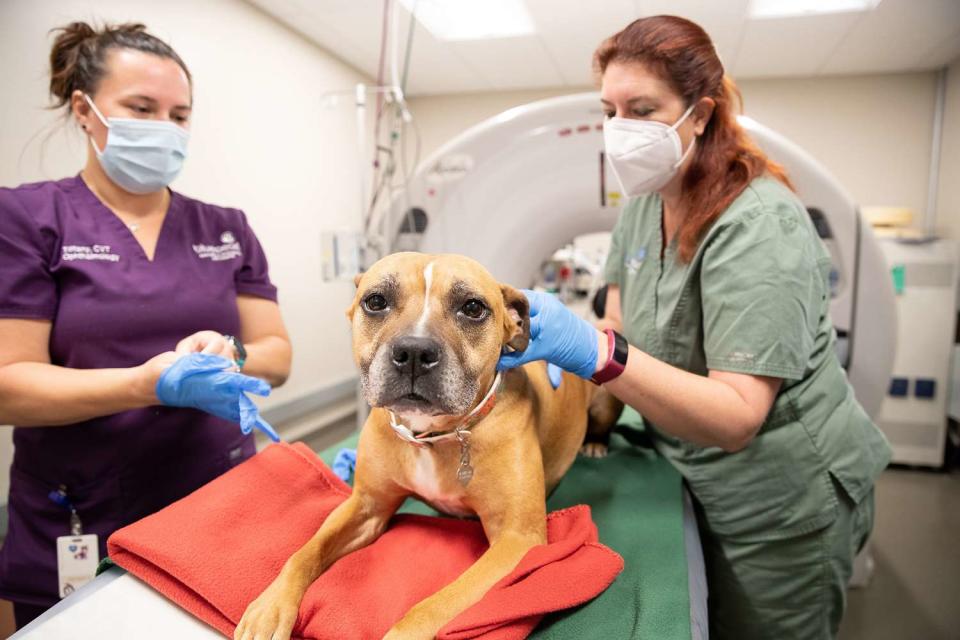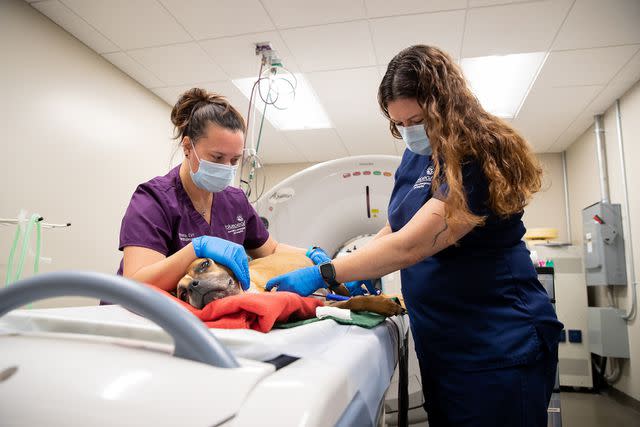Should My Pet Donate Blood? A Vet Expert Shares What to Know and Why Blood Donations Are Vital
One pet blood donation can saves the lives of three animals, according to veterinarian Dr. Meghan Respess

BluePearl Blood Bank
A dog donating blood at a BluePearl Pet Blood BankJanuary is National Blood Donor Month, and BluePearl, which operates numerous pet hospitals, is using the occasion to raise awareness about pet blood donations.
Like people, pets experiencing medical emergencies sometimes require blood transfusions, and those blood products often come from donations from healthy pets. Unfortunately, there is a nationwide shortage of pet blood products, much like the one humans are experiencing, according to BluePearl.
To help combat this shortage, BluePearl is using Blood Donor Month to encourage pet parents to bring their cat or dog to a BluePearl Pet Blood Bank location to donate blood products. BluePearl Pet Blood Banks provides BluePearl veterinary hospitals with the blood products needed to save animals' lives.
PEOPLE spoke with Dr. Meghan Respess, the director of national blood banking at BluePearl and a critical care veterinarian, about pet blood donation. Respess said she knows that many pet owners aren't aware that blood donation is an option for their cats and dogs and that others may have questions about the process.
To learn more about how pet blood donation works and if your pet is eligible to donate, read Repess' advice below.
Related: Hero Shelter Dog Saves Another Pup's Life with Emergency Blood Donation: 'A Really Sweet Puppy'

BluePearl Blood Bank
A dog giving a blood donation at a BluePearl Pet Blood Bank location.What is the state of the blood product shortage for pets?
"There is a rising demand in the veterinary industry for pet blood products because more pets are seeking emergency and specialty care. Just as they are in people, blood products are necessary to treat various conditions in pets, including hemorrhage, trauma, and chronic conditions," Respess shared.
While demand is high, donations are low. BluePearl estimates it will need triple the donations it received last year to meet the demand for pet blood products in 2024.
Why are pet blood donations important?
According to BluePearl, one pet blood donation can help save the lives of three animals. Pet blood product is used to treat numerous medical conditions and emergencies.
"Pet blood donations give pet patients a longer quality of life and save them from emergencies. We see a lot of trauma, so blunt and penetrating trauma. We see chronic conditions. And, as veterinary medicine advances and people think of their pets more as family members, we see pets live longer and notice more conditions. Some chronic health conditions in pets, like cancers, kidney disease, and others, require blood product transfusions — some toxicities as well," Respess said of the times pet blood products are used.
What are the requirements for a pet to be eligible to donate blood?
Repess told PEOPLE that BluePearl Pet Blood Banks are looking for healthy pets between the ages of 1 and 8. Pets must also meet a specific weight requirement to donate blood, usually 10 pounds or over for cats and 50 pounds or over for dogs.
Even if pets meet the requirements for donation, BluePearl still screens the animals to ensure that a pet blood donation is right for them physically and emotionally.
"Pets get a physical exam and then laboratory diagnostics, so that includes a general wellness profile and infectious disease testing because the safety of our blood products is of the utmost importance," Respess explained.
"In that screening process, we also assess a pet's behavior and stress level. That is extremely important — and I can't emphasize that enough — because although we need blood products, we really want each pet to come in and have a positive experience. So behavioral assessments for stress are also extremely important to that process," she added.
How does a pet parent set up a blood donation?
"BluePearl has about a dozen community blood banks," where pet parents can set up donations, Respess said. Owners can find the BluePearl Pet Blood Bank nearest them by visiting https://bluepearlvet.com/blood-bank/.
"If there's not a BluePearl near you, I encourage you to look into the specialty emergency hospitals in your area and see if they have an active bank you can participate in," the veterinarian added.
How long does a pet blood donation take?
"The blood donation collection is anywhere from five to 10 minutes. But before the collection, the pets have an exam; we do some pre-blood work and ensure that red blood cell levels are adequate. We check hemoglobin to ensure the pet is not anemic and check that the pet feels comfortable enough to donate. So in total, mostly anywhere from 30 to 60 minutes for the process from start to finish," per Respess.
Do pet parents have to pay any money to allow their pets to donate blood?
"No, this is completely free of charge. Pet owners have the benefit of getting a free exam for their pets and all of the laboratory diagnostics provided for them. There is no charge to the owner; they are there to make their pet a hero and help to save lives," Respess said.
How is pet blood donation advancing in 2024?
"The Association of Veterinary Hematology and Transfusion Medicine is an organization, of which I'm on the board, that is working towards developing blood bank standards in veterinary medicine as well as research and promoting other related industry standards," Respess said, adding that the organization is working to determine "concrete answers when it comes pet blood donation eligibility requirements and transfusion medicine and all things blood banking."
For more People news, make sure to sign up for our newsletter!
Read the original article on People.


